 width="150"/>
width="150"/>
by Erica Frank
A Bewildering Epic of Tiny Proportions
ACE Books is practically synonymous with "science fiction," but they also put out quite a bit of fantasy (for instance, most of the works of Andre Norton). The newest addition to their stable of fantasy authors is Lin Carter. His first foray into book-length (barely) work is, shall we say, ambitious…
The book is titled The Wizard of Lemuria but we don't meet the wizard until Chapter 4. There are 12 chapters. The first quarter of the novella-length book is spent introducing our hero, Thongor of Valkarth. He is, although a lowly barbarian mercenary, both mighty and honorable.
The book opens on the aftermath of a wager on a zamph race. Jeled Malkh—an officer and swordmaster—lost the wager, and attacked Thongor rather than pay up. Thongor quickly overcame him, shrugged off the bet, and offered to drink away their differences. Jeled refused and fought dirty, yet Thongor overcame him again, and again, offered him peace.
Very mighty. Very honorable. A man who doesn't like to kill other men, even cheating men.
Jeled Malkh accepted his offer of peace—then betrayed Thongor, stabbing him and throwing him in a cell. Thongor spends a lot of time in cells. Mighty he may be; clever he is not.
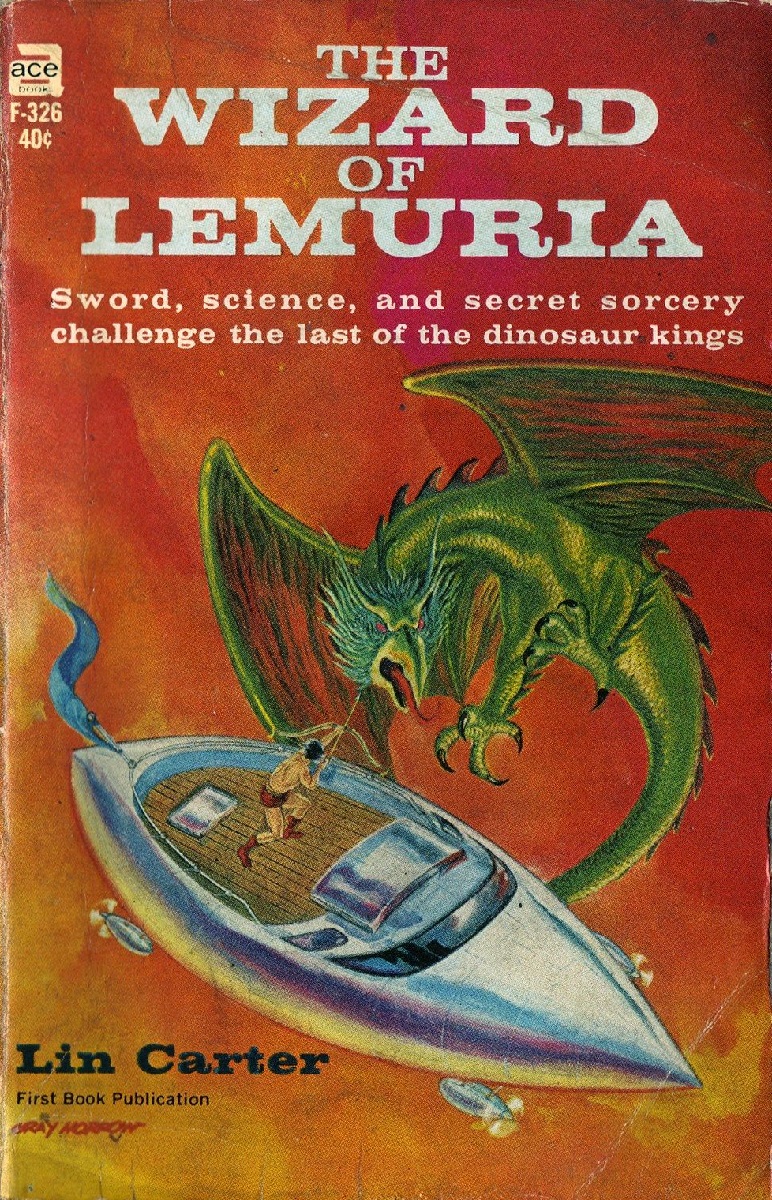
Gray Morrow's cover shows Thongor fighting a grakk from his air boat made of urlium, the weightless metal.
Thongor has friends, though, and one of them got him out of the cell. On his way out of town, he managed to steal an alchemist's experimental airboat. Thus equipped with exotic and fast transport, he aimed for the distant land of Kathool and promptly fell asleep.
He awoke to an attack by lizard-hawks, which battle you may see depicted on the book cover. Thongor did mightily well against them, as is his wont, but the boat was unmoving because its rotors had run down. Also, the winds had blown the boat far into the great jungle of Chush, and below him was one of the mighty dwarks, a jungle-dragon. In the ensuing fight, the boat crashed and he became lost in the jungle.
What would he do during the long watches of the night, still many hours away, when every dreaded predator of the jungles would be out roaming for food? How could he protect himself from the swift-footed poa that could out-race even a trained zamph—or from the man-eating zemedar with its six great arms—or the gigantic flying spiders?
His situation by night would be doubly dangerous, for due to the prevalence of slith in the trees, he would not be able to climb them and avoid the beasts.
By 25 pages into this story, I already had to keep track of twelve species, seven locations (not counting Lemuria itself), three status-related titles, and two deities. Four of these things would never be mentioned again.
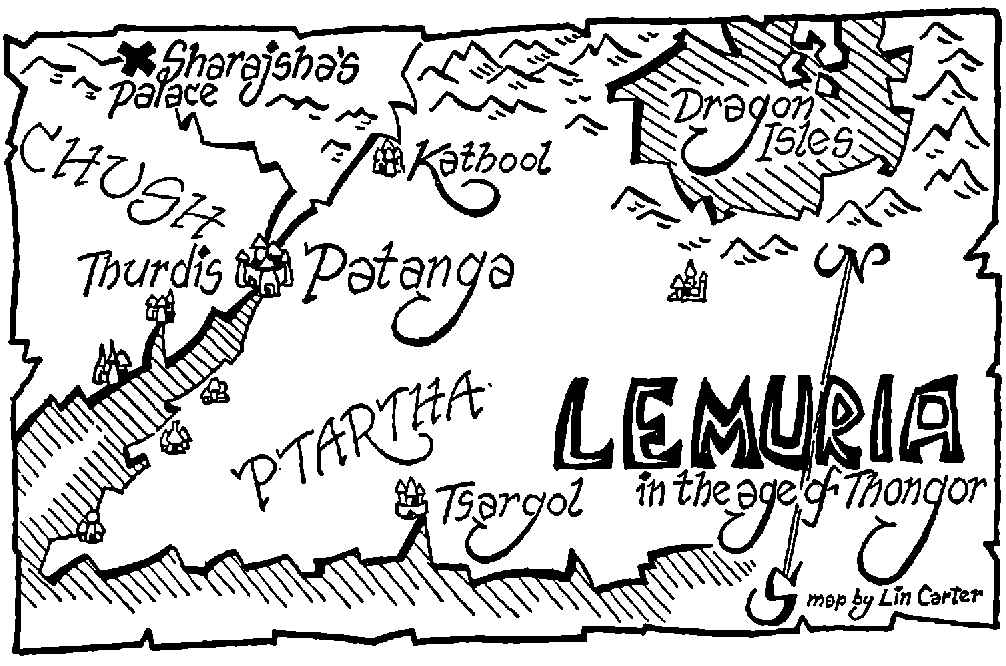
Not labeled on the map: the rivers Ysaar and Saan; the Mountains of Mommur surrounding the Dragon Isles; Sharimba, the "mightiest" mountain the range; Zharanga Tethrabaal, the Great Ocean; Neol-Shendis, the "Inner Sea" where the Dragon Isles lie.
Chapter 4 is where the actual plot began. Thongor was rescued by the Great Wizard of Lemuria, Sharajsha, who offers him a job: Help the wizard re-forge the great dragon-slaying sword and take on the remnants of the Dragon Kings, who are due to rise again and attempt to destroy the universe.
Fortunately, Sharajsha is wise, clever, talented, and resourceful, all traits that Thongor lacks. (Thongor, however, has mighty thews—iron thews, we are told—which is exactly what Sharajsha needs to face down the Dragon King hordes.) Sharajsha fixed up the damaged flying boat, and added a new mechanism, so that when one spring winds down, it winds up the other, so it will never again be left without power. With this perpetual motion machine neatly handwaved into existence, they set off on their journey together.

John Keely and one of his fraudulent perpetual motion motors, c. 1890
During their travels, Thongor acquires an ally, a Tsargolian nobleman named Karm Karvus, who was always referred to by both names, and princess/queen/Sarkaja Sumia, a beautiful woman whose throne had been usurped by evil priests.
I'm going to bypass the bulk of their adventures. The recurring sequence of events is: When Thongor gets himself captured (again), his allies in the flying ship look for the biggest scene of carnage and mayhem in the city to find and rescue him.
Musical Interlude
Each chapter of the book begins with an excerpt of poetry (save one that opens with literature). These are Epic Tales of Battle and Legendary Feats of Yore. They are obviously intended to be sung, or at least recited with something of a tune, to make them easy for a non-literate culture to remember. I do not know what tunes Thongor and his friends may have used for them, but I have found music that works for each of them.
The War Song of the Valkarthan Swordsmen, Thongor sings in battle; he must be formidable indeed if he can hack and stab his way through swarms of enemies while keeping enough breath to belt out a tune.
"All day our swords drank deep and long
Of blood wine-red, of blood wine-strong!
Tonight in the red halls of hell
We'll feast with foes and friends as well!"
As you can clearly see, this sings beautifully to "Greensleeves," and I choose to believe that the tune is much older than originally believed.
Thongor's Saga is presumably written after the conclusion of the book.
"The sliding hiss of scales on stone,
Weird green-flame eyes in shadows black,
When Thongor faced the slorgs alone
And cold steel drove the nightmares back!"
This works nicely with "Greensleeves" as well, which is fitting, as Valkarthians probably don't have the imagination to use different tunes for their war-songs.
Diombar's Song of the Last Battle describes how the Dragon Kings were defeated several thousand years ago.
"From wild red dawn to wild red dawn
we held our iron line
And fought till the blades broke in our hands
and the sea ran red as wine.
With arrow, spear and heavy mace
we broke the Dragon's pride,
Thigh-deep in the roaring sea we fought,
and crimson ran the tide."
This is more complex, and needs a tune with more variety. It scans wonderfully to the theme song from Gilligan's Island.
The Rituals of Yamath, chanted while making offerings to the God of Fire:
"The naked virgins on thine altars plead
As scarlet flame on pallid flesh doth feed!
Lord of the Fire, drink down young lives like wine—
Hearts, limbs and breasts—their very souls—are thine!"
This was harder to track down, as iambic pentameter is common for poetry, not songs. However, I did verify that "Battle of New Orleans" works nicely. The sacrifices in the book happened long before 1814, so they must have originally used a different tune.
The Scarlet Edda, which contains the prophecy the wizard fears.
"Lords of Chaos dark the sky:
All the Sons of Men shall die.
Dragon-rune and blood of men:
Portals ope—to close again?
Naught can make the Portals fade,
Save the Sword by lightning made."
As is appropriate for such an otherworldly subject, it can be sung to "Rock of Ages, Cleft for Me."

Now you, too, can sing along with Sharajsha as he describes the impending doom of Lemuria.
Words of Wizardry
The vocabulary is downright dizzying. Five of "the nineteen gods" are mentioned by name; one is a goddess. At least 12 cities are mentioned; more than half of them are only mentioned once or twice, and they are not visited. The vorn is a measure of distance: 5,555 "strides," claimed to be roughly the same as our mile. You might expect that distances are only measured in vorn, but no: while the Mountains of Mommur are "a stupendous wall of rock almost two thousand vorn in length," the Inner Sea is "[l]ocked in by miles of mountains"—those exact same mountains.
The various species and cultures of Lemuria are more interesting than Thongor's adventures, which can be summarized as, "Thongor meets great danger; Thongor kills great danger; Thongor is overwhelmed by even greater danger but his friends come to his aid; Thongor then slays the source of the great danger."
A Lemurian Bestiary and Herbarium
Three different creatures have the honor of being the worst monster in Lemuria: the grakks, the drawks, and the zemadar. The grakks and drawks are tied for "fiercest and most deadly fighters," while the "man-eating" zemadar is "the most dreaded." (I don't know why they're called "man-eating." It seems that all the creatures and some of the plants eat men.)
Note: Some creatures are italicized. Some are not. I could not find any pattern in this.
Bouphar, animal: Possibly cow-like. Common food animal, often roasted; also used for leather. The meat is called "beef."
Dream-Lotus, plant: A flower with sedative properties; it works on men and beasts. "One grain [of the dust] will transport a man to the dreamworlds… for many hours."
Dwark, animal: Giant forest dragon found in Chush: 200' long armored body, 60' long neck, and teeth longer than Thongor's sword.
Grakk, animal: Lizard-hawk, a giant predatory flying creature, with 40' batlike wings and a barbed tail. The young are called grakklets.
Lotifer, plant: Huge trees in Chush, sometimes 200 yards tall. All seem infested with slith
Photh, animal: Its skin is used for making scarlet leather pouches.
Poa, animal: Fast predator in the jungle of Chush
Sarn, plant: Berries found in the jungle of Chush, used for making a wine popular in Thurdis.
Slith, plant: Deadly vampire flowers that cover the trees in Chush; they are used for executions in Thurdis. They have "soft petals like a yawning mouth, laying bare the triple rows of hollow fangs."
Slorg, animal: Dreaded woman-headed serpent of Lemuria's deserts. These are near-mindless beasts, that attack in swarms. They have green flame eyes.
Spider, giant flying, animal: Yet another danger in Chush. This one does not make an appearance.
Waterfruit, plant: Fruit from Chush, small enough to be eaten by the handful.
Wolf, green, animal: Sharajsha has a book bound in the fur of a green wolf.
Zamph, animal: Somewhat-draconic creature used for riding or racing. It is a descendent of the triceratops, and somewhat resembles a rhinoceros. The reins are attachehed to iron rings that pierce the ears, the only portion of it that is sensitive to pain. Sharajsha's is wide enough to seat two people.
Zemadar, animal (also spelled zemedar): The shape is never described. It has six arms (plus some number of legs), a triple row of foot-long fangs with poison that instantly paralyzes, a barbed tail, and is very fast; described as a "crimson juggernaut." One of these was the "Terror of the Arena" in Tsargol. It is only vulnerable at the eyes.
But is it any good?
The book is surprisingly readable considering how packed it is with specialized vocabulary, including terms that are only mentioned once. Thongor's story, although rather predictable, contains powerful imagery; this book would do well converted to a movie or comic series.
As a book, however… the plot is cliched; the men are stereotypes; the woman is devoid of personality; the outcome is exactly as expected. Two stars, and half of one of those was probably the fun of singing Diombar's song to "Gilligan's Island."
[Speaking of books, Journey Press now has three excellent titles for your reading pleasure! Why not pick up a copy or three? Not only will you enjoy them all — you'll be helping out the Journey!]






![[July 2, 1966] The Big Thud (August 1966 <i>IF</i>)](https://galacticjourney.org/wp-content/uploads/2021/06/IF-1966-08-Cover-644x372.jpg)
![[June 24, 1966] Increments: <i>World's Best Science Fiction: 1966</i>, edited by Donald A. Wollheim and Terry Carr](https://galacticjourney.org/wp-content/uploads/2021/06/wollheim-66-cover-449x372.png)



![[June 2, 1966] Bad Decisions (July 1966 <i>IF</i>)](https://galacticjourney.org/wp-content/uploads/2021/05/IF-1966-07-Cover-654x372.jpg)


![[May 2, 1966] By Any Other Name (June 1966 <i>IF</i>)](https://galacticjourney.org/wp-content/uploads/2021/04/IF-1966-06-Cover-650x372.jpg)

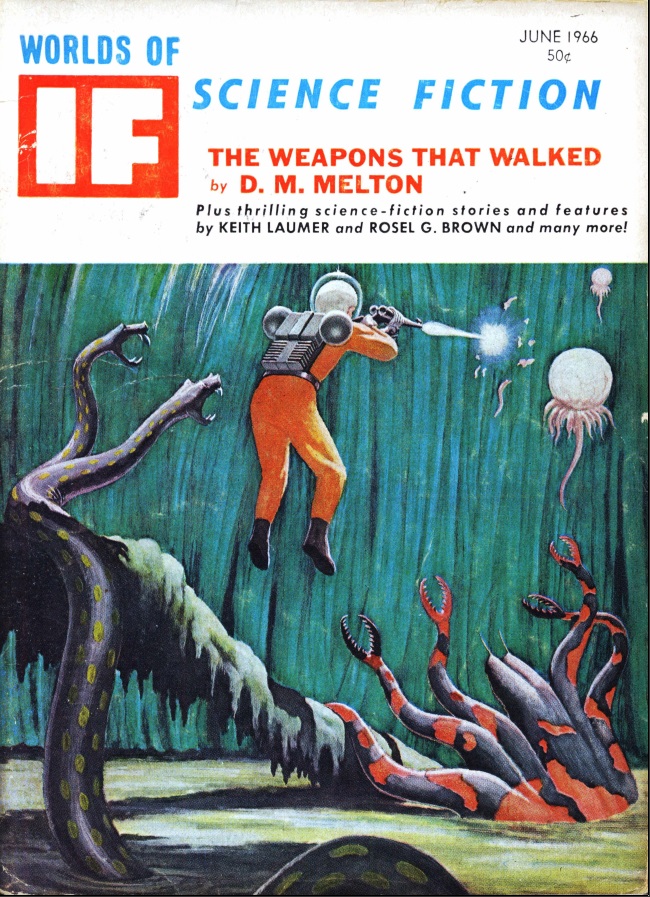
![[April 2, 1966] Hidden Truths (May 1966 <i>IF</i>)](https://galacticjourney.org/wp-content/uploads/2021/03/IF-1966-05-Cover-659x372.jpg)



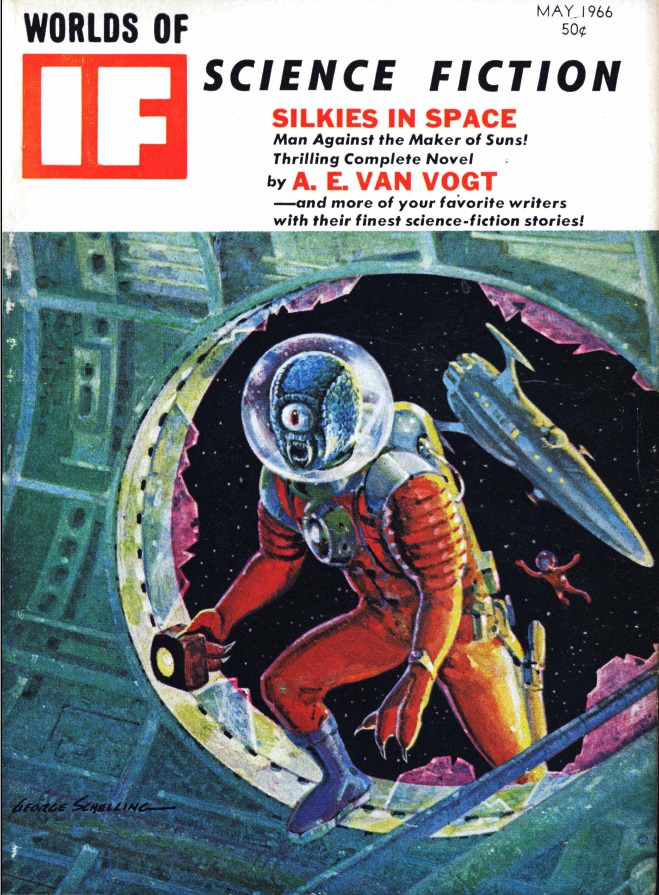
![[March 2, 1966] Words and Pictures (April 1966 <i>IF</i>)](https://galacticjourney.org/wp-content/uploads/2021/02/IF-1966-03-Cover-1-657x372.jpg)
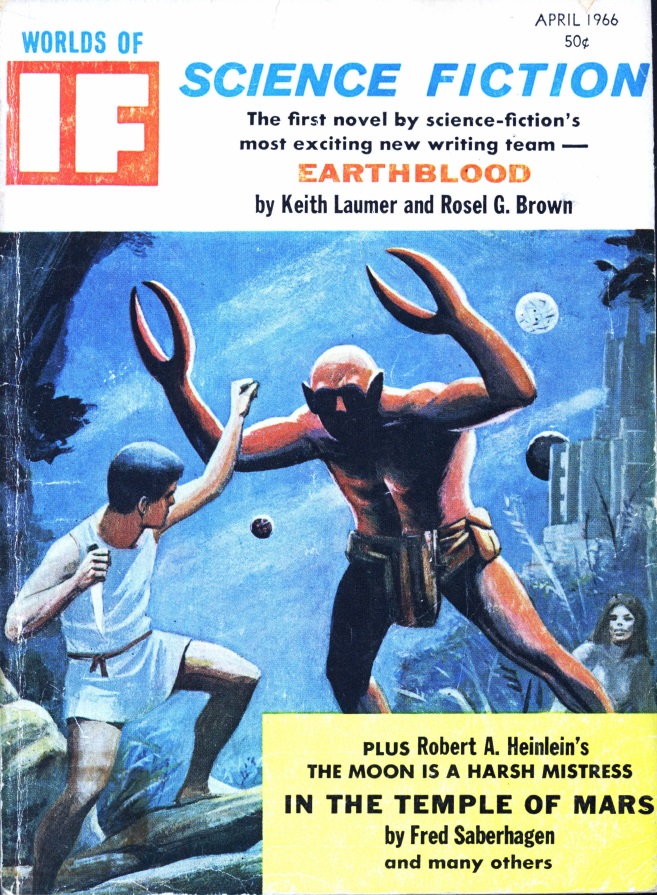
![[September 10, 1965] So Many Thews (Lin Carter's <em>The Wizard of Lemuria</em>)](https://galacticjourney.org/wp-content/uploads/2020/09/Cover-Wizard-of-Lemuria-672x372.jpg)
 width="150"/>
width="150"/>



